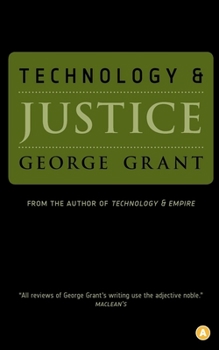Technology and Justice
Select Format
Select Condition 
Book Overview
George Grant--philosopher, conservative, Canadian nationalist, Christian--was one of Canada's most significant thinkers, and the author of Lament for a Nation, Technology and Empire, and English-Speaking Justice. Admirers and critics of the author will welcome these compelling essays about society's traditional values in a technological age.
Format:Paperback
Language:English
ISBN:0887845169
ISBN13:9780887845161
Release Date:September 1991
Publisher:House of Anansi Press
Length:134 Pages
Weight:0.40 lbs.
Dimensions:0.4" x 5.6" x 8.5"
Customer Reviews
3 ratings
Canada's voice in the wilderness
Published by Thriftbooks.com User , 23 years ago
George Grant has been one of my "heroes" ever since I read him an alternative course the freshman English in college in the early 70's. Grant changed my life and forced me to look at the metaphyscial implications of the idea of progress, of morality as "values" (as though they were a commodity), and most of all, oponed my eyes to the world of the great philosophers from Plato to Hegel. This book, the last one Grant published, is as collection of essays in which he shines through as always. Grant was a Christian Platonist who was influenced by Leo Strauss and Simone Weil. His philosophical conversation over the years was with Nietzsche and Heidegger, whome he regarded as having thought the implications of the modern project to its depths. Yet Grant says "NO" to Nietzsche and Heidegger, while at the same time recognizing the benifits of modern technology in terms of its reduction of human suffering. Grant never tires in showing how notions of justice in a technological society are no longer rooted in an overarching "given," a metaphysic to which humans are fitted for. The hubris of technology (a neologism of "making" and "knowing") has devalued life, Grant maintains, so that "qaulity" of life becomes the standard of deciding who should live and who need not live. Hence Grant is opposed both to abortion and euthanasia not to mention genocide in general. Grant's book is not easy. The essays have appeared in earlier forms and have been recrafted. Grant's language is evocative, but also very careful. His can appear to be a pessimist, but he claimed he was not. This book gives us further inklings of what he called "intimations of deprival" that have beset all who live in the technological empire. If you want to read a North American philosopher who faced the times yet found reasons for rejecting the finality of this age's horizons, Grant is the one to read.
Technology and the Fate of Modern Society
Published by Thriftbooks.com User , 23 years ago
George Grant, is a subtle and penetrating thinker with regard to technology and the fate of modern society. In this slim volume, Grant in a series of essays details the need to find a way to think about technology, i.e., the way we view technology and its impact on society. By discussing a diversity of thinkers such as Simone Weil, Nietsche, Plato and Heidegger as well as that on the issues of euthanasia and abortion, he has shown to us the historical fate of modern society which is infatuated with technology. The picture he painted is not pretty but I believe that one must have the courage to see historical reality as it is and not shy away from it. Only then, can we begin to look at ways to avoid the coming ruins of modern technological civilization.All in all, a very important book for anyone who is concerned with the fate of modern society.
The meaning of technology and its impact on justice
Published by Thriftbooks.com User , 25 years ago
For those who want to dig beneath the surface and begin to reflect on how technology is shaping us at the very core of who we are, this book is a must!If you have been stirred by essays of Wendell Berry to begin to question the wisdom of technological "progress", then George Grant will lead you further. He is able to communicate clearly without using dense jargon, but do not be fooled: his words are carefully chosen and demand to be read carefully.Grant himself has done a careful reading of Plato, Friederich Nietszche, Martin Heidegger, and Simone Weil. His understanding of these great thinkers will stimulate amateur philosophers to investigate these issues further. At the same time his interpretation of these thinkers will challenge the professionals, especially those who have bought into the post-modernist perspective.If you care about understanding how technology has propelled many of us into living such dry banal lives in the sterility of suburbia, this book is a must read. I read this book when it was first published over ten years ago. I have re-read it at least seven times since. Each time I read it, I see new things. It is a slim volume with less than 200 pages.If you are concerned about the disappearance of a clear understanding of justice, then Grant will reveal some underlying principles that lie at the heart of modern technology -- a dynamo that is corroding the western tradition of justice.





